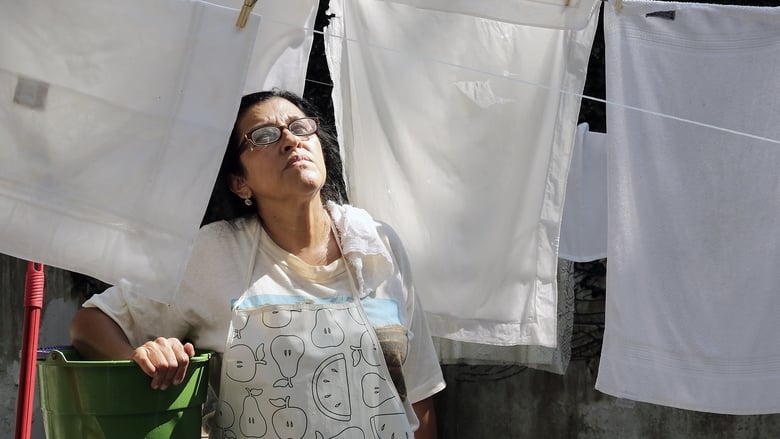The Second Mother (2015)
After leaving her daughter Jessica in a small town in Pernambuco to be raised by relatives, Val spends the next 13 years working as a nanny to Fabinho in São Paulo. She has financial stability but has to live with the guilt of having not raised Jessica herself. As Fabinho’s university entrance exams approach, Jessica reappears in her life and seems to want to give her mother a second chance. However, Jessica has not been raised to be a servant and her very existence will turn Val’s routine on its head. With precision and humour, the subtle and powerful forces that keep rigid class structures in place and how the youth may just be the ones to shake it all up.
Watch Trailer
Cast
Similar titles

Reviews
Redundant and unnecessary.
hyped garbage
At first rather annoying in its heavy emphasis on reenactments, this movie ultimately proves fascinating, simply because the complicated, highly dramatic tale it tells still almost defies belief.
The film's masterful storytelling did its job. The message was clear. No need to overdo.
This movies tells the interesting story of a nanny, Val, and her daughter, Jessica. The two have not seen each other in about ten years, and out of the blue, Jessica calls and is on her way to Sao Paolo to begin applying for university. The rest of the movie is a portrayal of Jessica and Val's rocky relationship over the socioeconomic classes that dictate Val's oppressed behavior. The most confusing part of the story for me is Jessica's aggressive reaction to her mother's position within the family that she is serving. The movie does not go into much details as to where Jessica was raised, but it is hinted that she came from the northeast. Her attitude is almost entitled as if she too is coming from the highest of the socioeconomic class of Brazil. While I disagree with the manner in which Val is treated by the family, there are certain social graces that most people understand regardless of socioeconomic class. Jessica's aggressive behavior causes a lot of tension between her and her mother, and I still do not understand where this is coming from. WE do not know if she is coming from a higher socioeconomic class than her mother. My theory is that she maybe is harboring a little bit of jealousy. Val has more or less been the mother figure to the son of the family, Fabrinho. While Jessica at a young age, had her mother stolen from her, Fabrinho had two. Sort of. Val seems to be kinder and more caring towards this young boy that is not even her own child. As a daughter, that must be hard to watch, and that is why I believe that Jessica is a little aggressive in her behavior at the family's home. The children of the domestic workers are almost getting the short end of the stick. She had to grow up without really knowing her mother, at the same time that her mother was taking care of a child that is not her own.
The Second Mother (2015) directed by Anna Muylaert is a fascinating film. I really love that the director focuses on positive aspects of topics that are not normally spoken about positively.This film focuses on the life of the protagonist Val. Val moves to Sao Paulo leaving her daughter behind to provide a better life for her. In Sao Paulo, Val works as a maid for a wealthy family. She lives with this family and takes care of the only child of the family, Fabinho. When Val's daughter, Jessica, is almost eighteen years old, she calls Val asking if she can live with her while she studies to take the admission exam at the University of Sao Paulo. Val asks the family she lives with for permission to let Jessica live with them while they look for an apartment for both of them. The lady of the house, Dona Barbara, gives Val permission. When Jessica arrives at the house of the wealthy family, she is surprised that she expects her to sleep in the tight room where Val stays. Dona Barbara's husband, Don Carlos, is attracted to Jessica. He lets her do what she wants and treats her like a person of the family. Val scolds Jessica a lot and tells her that she should not have social interactions with the family because they are poor.I love Jessica's character and the positive use that the director gave to that character. For example, the director gives a poor person access to one of the best universities in Brazil. On the other hand, a rich boy did not pass the exam to enter that university. I loved this because the director changed the typical stereotype. The director also did this with Jessicas' character by making her self-confident and fighting for her rights.
There have been many films about class relations: Renoir's La Règle du Jeu and so on. The best of the bunch manage to analyze class differences--and similarities--in intriguing ways. Que Horas Ela Volta? is one of those films.Val is a housemaid for an upper-class family in São Paulo. She lives miles away from her daughter Jéssica, but the job allows her to provide for her which lessens the pangs of guilt at least somewhat. Val actually lives in the residence, works very hard and in the thirteen years that pass, she forms a motherly bond with the son, Fabinho. His actual mother, Bárbara, is very career-oriented, you see, so you can see why he latches onto Val. We see how Val is simultaneously well off, but not truly respected. She presents Bárbara with a gift: a set of cups with a black/white color pattern. Bárbara acts as if she's pleasantly surprised and tells Val they'll save it for a special occasion. Well, the special occasion arrives, a party. Val brings out the cups, but Bárbara berates her, having already forgotten Val gifted them to her. Then one day, Val gets a call from Jéssica who's looking to participate in the admission exam at the University of São Paulo. She'd need a place to stay. Val, of course, immediately agrees, but what Jéssica doesn't know is that Val takes her work home with her, so to speak. It turns out that Jéssica is very confident and smart and it immediately becomes clear her presence will shake up this upper-class residence quite a bit.This being a film about class relations, it makes sense that this is the most stimulating aspect. It's funny to see this rich family's discomfort when the housemaid's daughter--of all people--appears more confident and smarter than Fabinho. Or note the similarities in expectations: Val works in almost slave-like fashion, but doesn't rebel, because she's been brought up with the notion that this is the way the world works. The rich family obviously holds similar opinions, otherwise they'd treat Val better. Another interesting thing to note is the role of the mother (the English title for the film is The Second Mother). Val hasn't been the mother to Jéssica she feels she should have been due to the literal distance between them. Then you've got Bárbara whose relationship with Fabinho is pretty much non-existent despite the fact they occupy the same living space.The film almost risks falling into the familiar trap of showing the lower class folks to be real human beings as opposed to the upper class scumbags whose morals and decency have slowly eroded over the years in the pursuit of the almighty dollar (or peso), etc. While Val and Jéssica - and thus the 'lower class' - ultimately triumph, the overall portrayal of these characters remains nuanced and believable.And that's how I'd describe the entire film: nuanced and believable. I do think Val's character development could've been paid more attention (particularly toward the end) and Jéssica could've been introduced a little sooner as that's when film really comes alive, but overall it's a good examination of class relations that doesn't get bogged down in melodrama.
I really loved it, and I think it's one of Brazil's best movies.It is about the relationship between Brazilian employers and employees. Val, the maid, has been working at a house for many years. Her employers like her and treat her well. Their son sees her as his second mother. However,this is about to change when her daughter comes to town and has to stay there for a few days. The prejudice towards Val comes to surface as she finds out it is not so easy to be poor in Brazil. The main actress is amazing, and so is the whole cast. It surely deserves at least an Oscar nomination for best foreign movie. I hope everybody gets the chance to watch it and love it.









